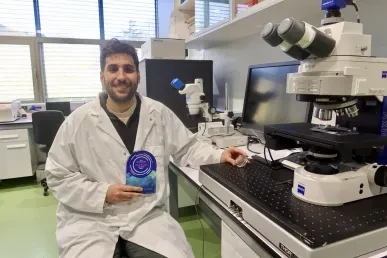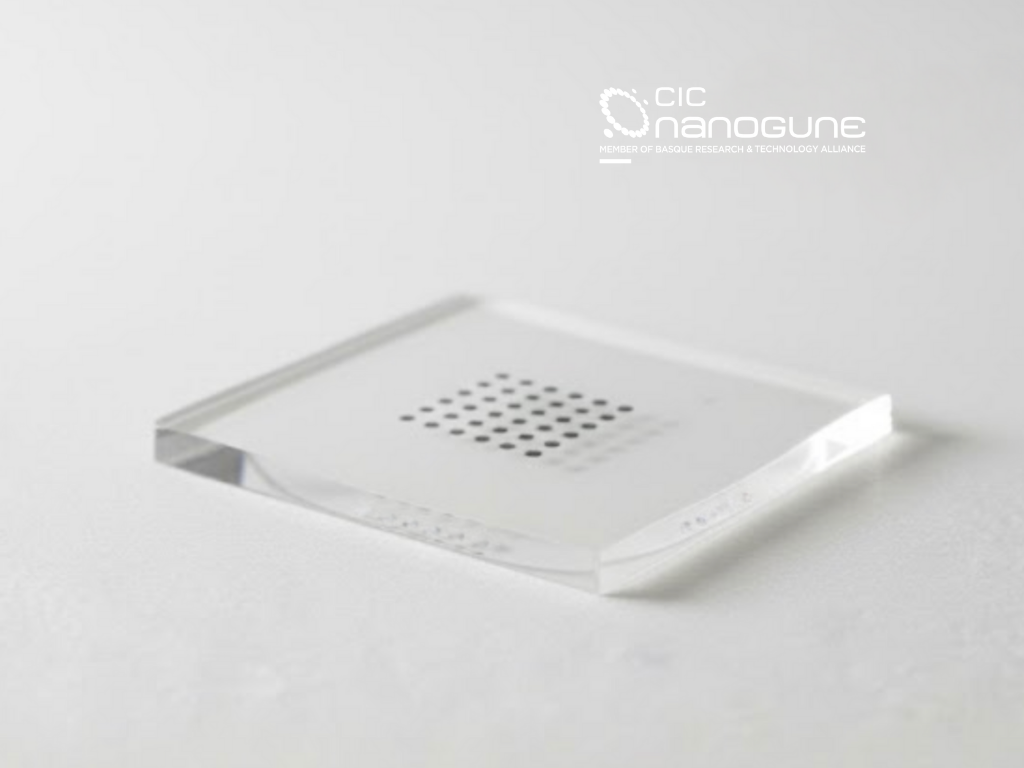EIT Jumpstarter award for CIC nanoGUNE’s Prospect Biotech business project
The new enterprise, due to be set up in December, will be optimising cell cultures by combining Raman spectroscopy, nanoparticles and AI. This technology allows the early detection of culture anomalies and greater efficiency in accelerating cancer treatments such as CAR-T.

CIC nanoGUNE is fine-tuning the launch of Prospect Biotech, a business initiative that aims to optimise the production and monitoring phases of cell therapies such as CAR-T, thus making them more accessible and efficient. The new enterprise will be exploiting technology developed by the researcher Javier Plou at nanoGUNE; it has received backing from Basque Tek Ventures and the renowned EU EIT Jumpstarter programme, for which it received an award this very week at the Grand Final in Budapest.
The passion of Javier Plou, Prospect Biotech’s scientific director, for transferring science to clinical practice became the starting point for a business project that today promises to transform the future of treatments, such as CAR-T, which use the body's immune system to fight cancer.
CAR-T is a type of therapy in which the patient becomes his or her own donor. It involves modifying the patient's T lymphocytes so that they have the ability to attack tumour cells. But how can we know, in real time and without interfering in the process, whether a CAR-T therapy is working properly? The therapy is limited by the lack of efficiency in monitoring cell cultures. What is more, current technologies do not allow optimal quality control, which affects scalability and makes the process more expensive.
Prospect Biotech is developing a solution based on Raman spectroscopy —an optical technique capable of analysing molecular composition without the need for contact or reagents— and its enhanced nanoparticle modality amplifies the signal and increases sensitivity in biomarker detection. The combination of both, incorporating AI algorithms, allows real-time monitoring of critical cell process parameters, early detection of anomalies, and real-time production optimisation.
 “What started out as a lab idea has consolidated into an initiative with real potential for biomedical impact,” said Ainara García-Gallastegui, head of technology transfer at nanoGUNE. “This new enterprise has emerged to offer solutions that reduce costs, improve efficiency and, above all, help treatments such as CAR-T reach those who need them sooner and more safely,” added García-Gallastegui.
“What started out as a lab idea has consolidated into an initiative with real potential for biomedical impact,” said Ainara García-Gallastegui, head of technology transfer at nanoGUNE. “This new enterprise has emerged to offer solutions that reduce costs, improve efficiency and, above all, help treatments such as CAR-T reach those who need them sooner and more safely,” added García-Gallastegui.
Following recent advances in immuno-oncology, which are already improving survival rates, this technology —patented by nanoGUNE— provides new tools for moving towards more efficient, more accessible and safer personalised medicine.
European recognition: EIT Jumpstarter
The business initiative led by Javier Plou achieved second place among the start-ups in the Health category of the prestigious EIT Jumpstarter programme, one of Europe's leading pre-acceleration programmes for researchers and innovators in the early stages of their careers. Out of the 908 initial entries across multiple sectors, the initiative led by nanoGUNE stood out for its scientific excellence and market potential, earning a place in the Grand Final in Budapest on 25 November 2025. In the final, the short-listed entries presented their projects to real investors, and Prospect Biotech was the runner-up in the Health category.
The EIT Jumpstarter is a seven-month EU-funded initiative designed to help transform research into viable businesses. Successful participants receive up to €12,000 in funding, intensive training in business fundamentals, and access to a European network of mentoring, investment, and industry leadership, in addition to the corresponding prizes.
Javier Plou
Having received a Bachelor's Degree in Biotechnology and a Master's in Bioengineering from the University of Zaragoza, he began his research career focusing on cell culture on platforms that reproduce human tissue using microfluidic systems. During this period, he sought to better understand culture processes and develop tools to analyse them without destroying the samples. This concern led him to work at CIC biomaGUNE and CIC bioGUNE in 2017, where he wrote up his PhD thesis on the development of nanoparticle-based sensors applied to the study of the tumour microenvironment and its impact on the immune response. After completing his thesis and driven by the desire to transfer the results of his research to the applied field, he joined a project at nanoGUNE alongside Andreas Seifert in 2022, aimed at integrating these technologies into cell therapies using Raman spectroscopy and its SERS variant. The project gradually took shape and moved towards consolidation as a business initiative with the potential to exert a real impact in the biomedical field.
